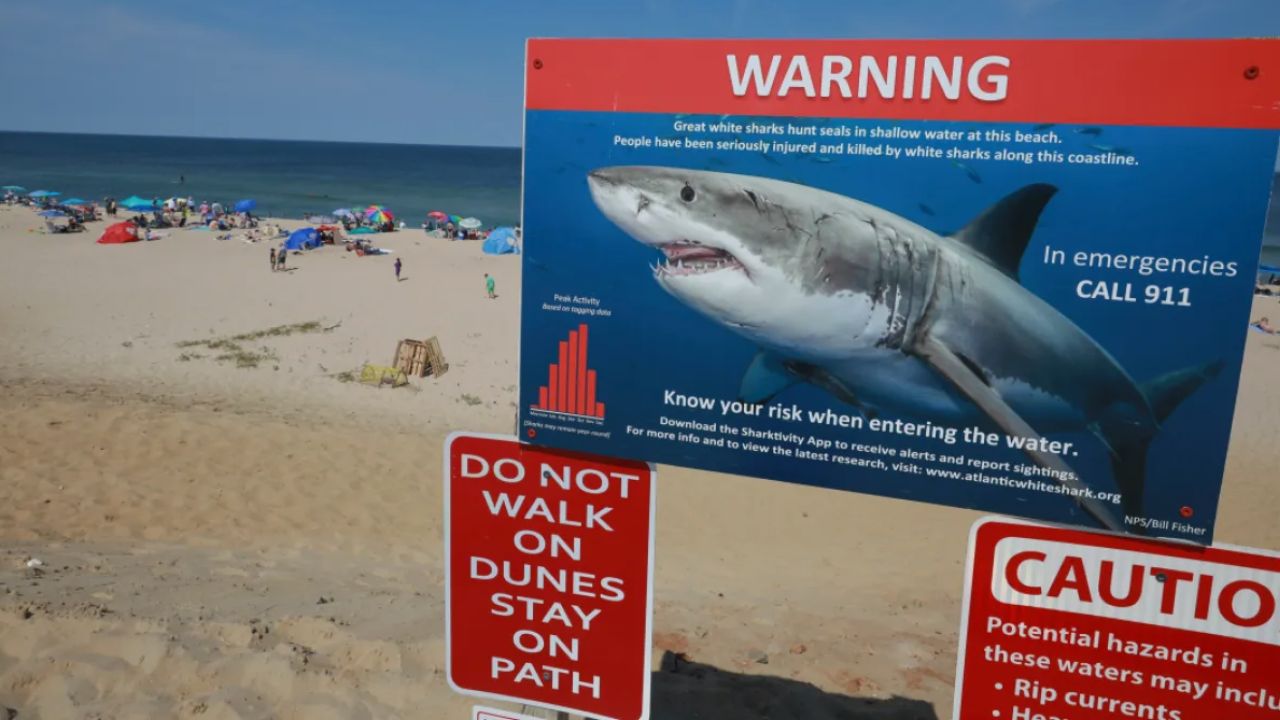Plymouth, MA – Two popular beaches near Plymouth, Massachusetts, reopened on Monday following a startling white shark attack on a seal in nearby coastal waters. The incident, which took place off Manomet Point over the weekend, prompted local officials to temporarily close Plymouth White Horse Beach and Long Beach as a precautionary measure to protect beachgoers.
Though the beaches have since reopened, authorities are urging visitors to practice caution due to the heightened white shark activity typical during the late summer and early fall months. With the peak season for white sharks spanning from August through October, officials stress the importance of vigilance and adherence to safety guidelines to minimize risk.
Details of the Shark-Seal Incident and Beach Closures
Over the recent weekend, a white shark was observed attacking a seal near Manomet Point, a well-known coastal area. This behavior is natural, as seals are primary prey for white sharks, especially in shallow waters where hunting is most effective.
The immediate response involved temporarily shutting down Plymouth White Horse Beach and Long Beach, both located north of Manomet Point. These closures aimed to safeguard the public while wildlife experts assessed the situation.
Safety Guidelines for Beachgoers Amid Increased Shark Activity
The Massachusetts Department of Fish and Game, together with local authorities, has issued important recommendations to ensure safe beach experiences during this period of increased shark presence:
- Understand shark hunting behavior: Sharks often hunt seals in shallow waters.
- Stay close to shore: Proximity to shore ensures quicker help if any incident occurs.
- Avoid swimming alone: Always enter the water in groups.
- Steer clear of areas with seals or schools of fish: These attract sharks.
- Do not swim in murky water: Avoid areas where visibility is poor.
- Minimize splashing: Excessive splashing can attract sharks.
- Heed lifeguard and official advice: Follow posted warnings and instructions promptly.
“White sharks typically inhabit tropical and temperate waters throughout the western North Atlantic—including the Caribbean Sea—and migrate seasonally along the eastern U.S. coast,” explained representatives from the Massachusetts Department of Fish and Game.
Read Also: Coastal Storm Brings Flooding Concerns and Dangerous Surf to North Carolina and Virginia
Understanding White Shark Migration and Behavior on the U.S. East Coast
White sharks are known for their seasonal migrations, moving along the eastern seaboard annually. These movements bring them into more frequent proximity with popular beaches, such as those near Plymouth, during late summer and early fall.
This natural migration pattern, combined with the presence of prey species like seals, explains the timing and location of recent white shark activity. Beaches along Massachusetts coastlines are thus urged to maintain heightened awareness during these months.
Looking Ahead: Staying Safe This Shark Season
While shark attacks on humans remain rare, the recent seal attack acts as a clear reminder of the need for vigilance along the Massachusetts coast. Officials continue to monitor shark movements and stress the importance of public compliance with safety guidelines to minimize risks.
For more information on current beach conditions and expert advice, visit Fox Weather coverage.
Key Points to Remember:
- White shark activity peaks from August through October.
- Beach closures are temporary and precautionary.
- Adhering to safety guidelines significantly reduces risk.
- Authorities remain vigilant and ready to respond.
What do you think about the recent white shark activity near Plymouth? Have you visited Plymouth White Horse or Long Beach recently? Share your experiences and thoughts in the comments below!


 by
by 

